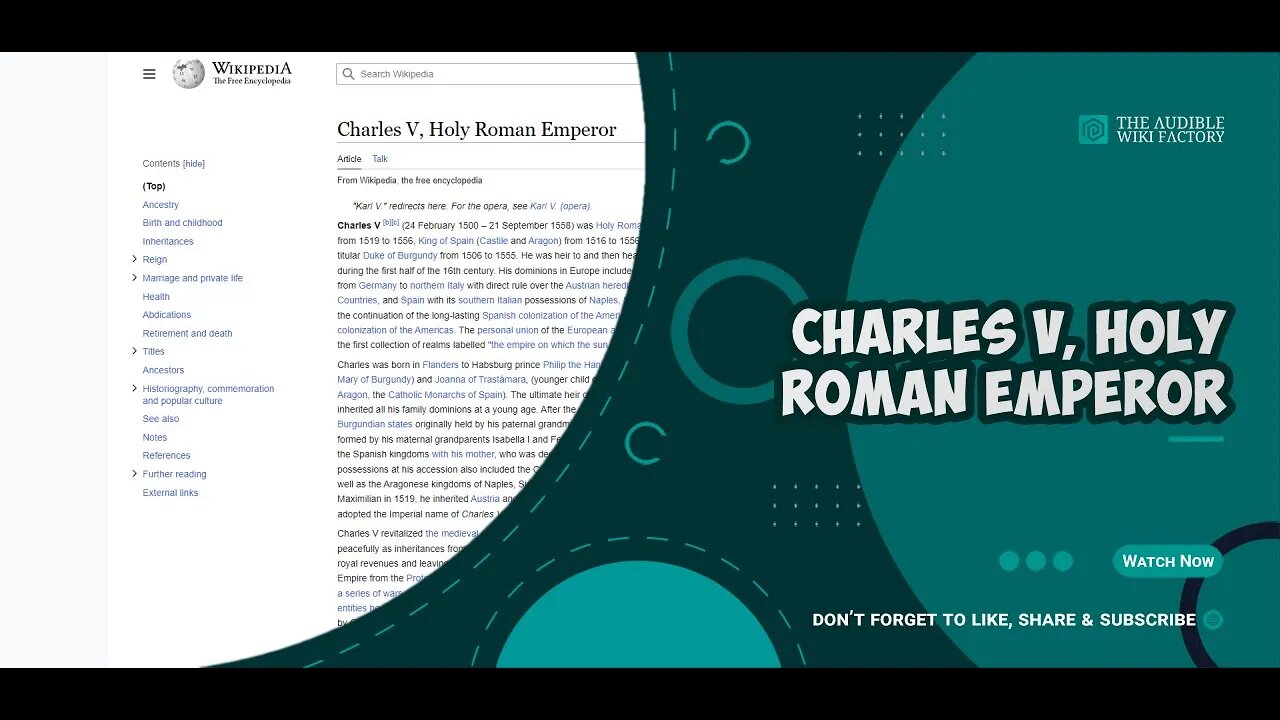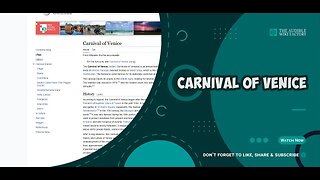Premium Only Content

Charles V was Holy Roman Emperor and Archduke of Austria from 1519 to 1556, King of Spain from
Charles V was Holy Roman Emperor and Archduke of Austria from 1519 to 1556, King of Spain (Castile and Aragon) from 1516 to 1556, and Lord of the Netherlands as titular Duke of Burgundy from 1506 to 1555. He was heir to and then head of the rising House of Habsburg during the first half of the 16th century. His dominions in Europe included the Holy Roman Empire, extending from Germany to northern Italy with direct rule over the Austrian hereditary lands and the Burgundian Low Countries, and Spain with its southern Italian possessions of Naples, Sicily, and Sardinia. He oversaw both the continuation of the long-lasting Spanish colonization of the Americas and the short-lived German colonization of the Americas. The personal union of the European and American territories of Charles V was the first collection of realms labelled "the empire on which the sun never sets".
Charles was born in Flanders to Habsburg prince Philip the Handsome (son of Maximilian I of Habsburg and Mary of Burgundy) and Joanna of Trastámara, (younger child of Isabella I of Castile and Ferdinand II of Aragon, the Catholic Monarchs of Spain). The ultimate heir of his four grandparents, Charles unexpectedly inherited all his family dominions at a young age. After the death of his father Philip in 1506, he inherited the Burgundian states originally held by his paternal grandmother Mary. In 1516, inheriting the dynastic union formed by his maternal grandparents Isabella I and Ferdinand II, he became king of Spain as co-monarch of the Spanish kingdoms with his mother, who was deemed incapable of ruling due to mental illness. Spain's possessions at his accession also included the Castilian colonies of the West Indies and the Spanish Main as well as the Aragonese kingdoms of Naples, Sicily and Sardinia. At the death of his paternal grandfather Maximilian in 1519, he inherited Austria and was elected to succeed him as Holy Roman Emperor. He adopted the Imperial name of Charles V as his main title, and styled himself as a new Charlemagne.
Charles V revitalized the medieval concept of universal monarchy. Although his empire came to him peacefully as inheritances from strategic marriages, he spent most of his life waging war, exhausting his own royal revenues and leaving debts to his successors in his attempt to defend the integrity of the Holy Roman Empire from the Protestant Reformation, the expansion of the Muslim realms of the Ottoman Empire, and in a series of wars with France. With no fixed capital city, he made 40 journeys, travelling in different entities he ruled; he spent a quarter of his reign travelling within his realms. The imperial wars were fought by German Landsknechte, Spanish tercios, Burgundian knights, and Italian condottieri. Charles V borrowed money from German and Italian bankers and, in order to repay such loans, he relied on the proto-capitalist economy of the Low Countries and on the flow of precious metal, especially silver, from Mexico and Peru to Spain, which caused widespread inflation. During his reign his realms expanded by the Spanish conquest of the Aztec and Inca empires by the Spanish conquistadores Hernán Cortés and Francisco Pizarro, as well as the establishment of Klein-Venedig by the German Welser family in search of the legendary El Dorado. In order to consolidate power early in his reign, Charles overcame two insurrections in Spain (the Comuneros' Revolt and Brotherhoods' Revolt) and two German rebellions (the Knights' Revolt and Great Peasants' Revolt). He suppressed a major rebellion of Spanish colonists in Peru in the 1540s.
Crowned King in Germany, Charles sided with Pope Leo X and declared Martin Luther an outlaw at the Diet of Worms (1521). The same year, Francis I of France, surrounded by the Habsburg possessions,...
LINK TO ARTICLE: http://en.wikipedia.org/wiki/Charles_V,_Holy_Roman_Emperor
TAGS: Charles V Holy Roman Emperor, Dukes of Carniola, Counts of Malta, Spanish infantes, Spanish exploration in the Age of Discovery, Rulers of the Habsburg Netherlands, Princes of Asturias, Nobility from Ghent, Monarchs who abdicated, Modern child rulers, Margraves of Namur, Knights of the Golden Fleece, Knights of the Garter, Knights of Santiago, Grand Masters of the Order of the Golden Fleece, Dukes of Montblanc, Dukes of Milan, Dukes of Burgundy, Deaths from malaria, Counts of Charolais, Counts of Burgundy, Counts of Barcelona, Castilian infantes, Burials in the Pantheon of Kings at El Escorial, Aragonese infantes, 16th-century Navarrese monarchs, 16th-century monarchs of Naples, 16th-century Spanish monarchs, 16th-century archdukes of Austria, 16th-century Roman Catholics, 16th-century Kings of Sicily, 16th-century Castilian monarchs, 16th-century Aragonese monarchs
#GeneralKnowledge #AudibleWikiFactory #Audible #Wikipedia #CharlesV,HolyRomanEmperor
-
 13:12
13:12
The Audible Wiki Factory
2 years agoThe Carnival of Venice is an annual festival held in Venice, Italy. The carnival ends on Shrove
540 -
 LIVE
LIVE
Rebel News
58 minutes agoCarney's flawed LNG deal, Libs keep mass immigration, Poilievre's plan to fix it | Rebel Roundup
257 watching -
 27:39
27:39
Crypto.com
4 hours ago2025 Live AMA with Kris Marszalek, Co-Founder & CEO of Crypto.com
54.2K4 -
 LIVE
LIVE
TheAlecLaceShow
1 hour agoMAGA Pushback Against Flag Burning EO & 600K Chinese Students | Cashless Bail | The Alec Lace Show
97 watching -
 1:09:18
1:09:18
SGT Report
16 hours agoBIOHACKING 101: MAKING BIG PHARMA IRRELEVANT -- Dr. Diane Kazer
21.5K19 -
 DVR
DVR
JuicyJohns
5 hours ago $1.35 earned🟢#1 REBIRTH PLAYER 10.2+ KD🟢
42K -
 LIVE
LIVE
The Mel K Show
2 hours agoMORNINGS WITH MEL K - The Future of the Constitutional Republic: Local Action for National Impact 8-26-25
703 watching -
 LIVE
LIVE
The Shannon Joy Show
3 hours ago🔥🔥TACO Trump Rug Pulls AGAIN - Deploying His Fascist Police State In Red States NOT Blue.🔥🔥
215 watching -
 29:43
29:43
Grant Stinchfield
2 hours agoBig Pharma’s Dirty Secret: It Writes the Medical School Curriculum
6.01K5 -
 1:10:58
1:10:58
vivafrei
4 hours agoBanning the Burning of the Flag? Raja Jackson Assault & Some Insanely Stupid Takes! NYC Chems & MORE
38.4K41